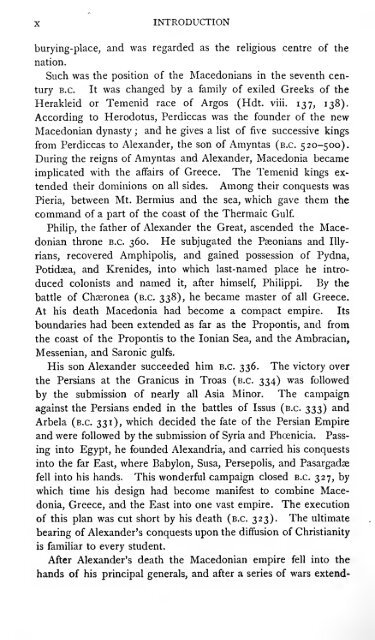Philippians and Philemon - MR Vincent - 1906.pdf
Philippians and Philemon - MR Vincent - 1906.pdf
Philippians and Philemon - MR Vincent - 1906.pdf
You also want an ePaper? Increase the reach of your titles
YUMPU automatically turns print PDFs into web optimized ePapers that Google loves.
INTRODUCTION<br />
burying-place, <strong>and</strong> was regarded as the religious centre of the<br />
nation.<br />
Such was the position of the Macedonians in the seventh cen-<br />
tury B.C. It was changed by a family of exiled Greeks of the<br />
Herakleid or Temenid race of Argos (Hdt. viii. 137, 138).<br />
According to Herodotus, Perdiccas was the founder of the new<br />
Macedonian dynasty ; <strong>and</strong> he gives a list of five successive kings<br />
from Perdiccas to Alex<strong>and</strong>er, the son of Amyntas (b.c. 520-500).<br />
During the reigns of Amyntas <strong>and</strong> Alex<strong>and</strong>er, Macedonia became<br />
implicated with the affairs of Greece. The Temenid kings ex-<br />
tended their dominions on all sides. Among their conquests was<br />
Pieria, between Mt. Bermius <strong>and</strong> the sea, which gave them the<br />
comm<strong>and</strong> of a part of the coast of the Thermaic Gulf.<br />
Philip, the father of Alex<strong>and</strong>er the Great, ascended the Mace-<br />
donian throne B.C. 360. He subjugated the Paeonians <strong>and</strong> lUy-<br />
rians, recovered Amphipolis, <strong>and</strong> gained possession of Pydna,<br />
Potidaea, <strong>and</strong> Krenides, into which last-named place he intro-<br />
duced colonists <strong>and</strong> named it, after himself, Philippi. By the<br />
battle of Chaeronea (b.c. 338), he became master of all Greece.<br />
At his death Macedonia had become a compact empire. Its<br />
boundaries had been extended as far as the Propontis, <strong>and</strong> from<br />
the coast of the Propontis to the Ionian Sea, <strong>and</strong> the Ambracian,<br />
Messenian, <strong>and</strong> Saronic gulfs.<br />
His son Alex<strong>and</strong>er succeeded him b.c. 336. The victory over<br />
the Persians at the Granicus in Troas (b.c. 334) was followed<br />
by the submission of nearly all Asia Minor. The campaign<br />
against the Persians ended in the battles of Issus (b.c. 333) <strong>and</strong><br />
Arbela (b.c. 331), which decided the fate of the Persian Empire<br />
<strong>and</strong> were followed by the submission of Syria <strong>and</strong> Phoenicia. Pass-<br />
ing into Egypt, he founded Alex<strong>and</strong>ria, <strong>and</strong> carried his conquests<br />
into the far East, where Babylon, Susa, Persepolis, <strong>and</strong> Pasargadae<br />
fell into his h<strong>and</strong>s. This wonderful campaign closed b.c. 327, by<br />
which time his design had become manifest to combine Mace-<br />
donia, Greece, <strong>and</strong> the East into one vast empire. The execution<br />
of this plan was cut short by his death (b.c. 323). The ultimate<br />
bearing of Alex<strong>and</strong>er's conquests upon the diffusion of Christianity<br />
is familiar to every student.<br />
After Alex<strong>and</strong>er's death the Macedonian empire fell into the<br />
h<strong>and</strong>s of his principal generals, <strong>and</strong> after a series of wars extend-





